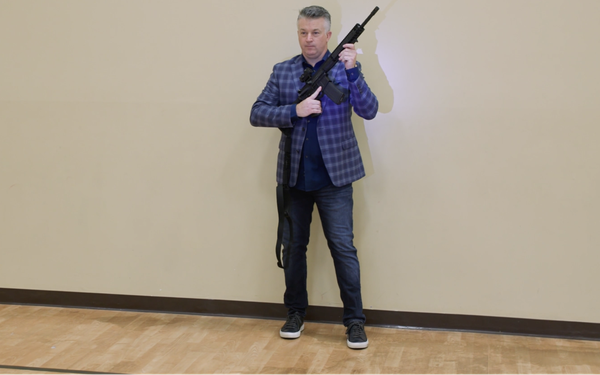Commentary
Breakthrough Device Takes Aim At Cancer Detection, Guns -- And More
- by Les Luchter , Staff Writer, May 2, 2024

Image above: Lee Duke, BMRT president, in a video showing how company's device can detect the presence of guns.
A device that can detect the earliest stages of cancer and other diseases when aimed at people?
It sounds like something out of science fiction, but even Dr. McCoy’s famed medical scanner on the original “Star Trek” couldn’t detect the presence of guns and other weapons.
Base molecular resonance (BMR), a new, quite-real technology, can do all that -- and more, according to Bo Short and Lee Duke, co-founders of a new firm using the technology.
The uber-disruptive BMR, in development for over two decades, transmits very low-frequency -- and thus harmless -- waves to detect any designated substance based on its subatomic structure.
With patents and initial funding now in hand, Short and Duke, guardians of BMR and co-founders of a new firm called Base Molecular Resonance Technologies (BMRT), spoke with Pharma & Health Insider about the huge task – and responsibilities --- now before them.
advertisement
advertisement
Harnessing a technology that applies to dozens of verticals --“almost like having a candy store,” CEO Short says -- he and Duke chose three of them to focus on at first: medical, for early detection of cancer and other diseases: security, for the detection of guns and ammunition; and military, which the founders are a bit more discreet about (they’re in discussions with “some of the largest defense contractors in the world”) -- but let’s say something like landmine detection.
Short and company president Duke hope to have products in the market for all three applications within a couple of years, but acknowledge that medical use will be last due to the need for FDA approval. Unlike for drugs, though, that approval can come fairly soon under the agency’s Breakthrough Devices Program.
“They [the FDA] recognize that there’s a public need for expediting any product that can decrease morbidity and mortality,” says Duke, who boasts a background in the medical device field with dental implant manufacturer Straumann and has also worked at Abbott Laboratories and other health companies.
Short says the science behind the technology was validated by a third-party study in 2004, and that another study by an organization and a “world renowned scientist from the UK” will begin later this month and is expected to be completed by the end of June. That study will look specifically at the technology's ability to detect gunpowder, cancer, illegal drugs and military-related “high-energy targets.”
And next up, aiming for that FDA approval, will be clinical tests on human patients that will be conducted with a university.
Short thinks of what can be accomplished by using BMR for early detection of cancer and other diseases -- perhaps even by PCPs during annual exams.
Each year, he notes in a BMRT demo video, “10 million people around the world die of cancer, most of them late detection.”
“If you can detect cancer at its earliest stages,” Short tells us, “you can potentially get rid of stage 3 and 4 cancers, and save millions of lives, billions of dollars, and untold pain and suffering.”
For him, the cause is personal: “My mom passed away from ovarian cancer and it wasn’t discovered until it was stage 4. It was too late.”
A throat cancer survivor himself, Short also stresses how BMR could reduce patient stress. “It took me almost two months to find out I had cancer,” he says. “Not knowing for two months was more agony than when I found out.”
Short and Duke say that getting BMR products to market means more than the potential financial rewards (Short estimates that BMRT could eventually have revenues of $200+ billion annually, becoming “one of the largest companies in the world”) but is literally a matter of life and death.
The product’s patent was granted “right around the time of the Nashville school shooting,” Duke, says, adding “The problem with active shooters today is, you know about it when they’re already in the school, shooting. You want to know about it when they’re pulling into the parking lot, so they never get into the building.”
Going back to the device's medical uses, Duke cites his own father as an example of how BMRT’s disease detection goes beyond cancer,
“My dad recently had his PSA level shoot up and we scanned him for prostate cancer,” Duke recalls. “That came back negative, so we scanned him for benign prostate hyperplasia, and that came back positive.” His dad then went back to the doctor and was told, “’Well, you don’t have prostate cancer, you have benign hyperplasia.’ He looked at the doctor and said, ‘Yeah, I already knew.’”
“Your mind just expands with the potential of what you can do to help mankind,” says Short. Besides the big three verticals at the top of their list, the co-founders also mention detection of molds and precious metals during our interview. On their website, a huge list of other verticals scrolls by: drug testing, building inspections, automotive emissions, etc., etc.
BMRT can “literally change the landscape of safety, health and security for millions of people around the world,” Short says.
“Forget the business part of it. That will take care of itself,” he states, adding that what most concerns Duke and himself is “the potential of what it can do to impact people. This keeps us up at night. Every day that this isn’t in the marketplace is a day we feel like we’ve not done something we should do.”



Cancer is not a joke, please leave it to scientists & medical professionals.
Please leave your security and military play toys out of this.